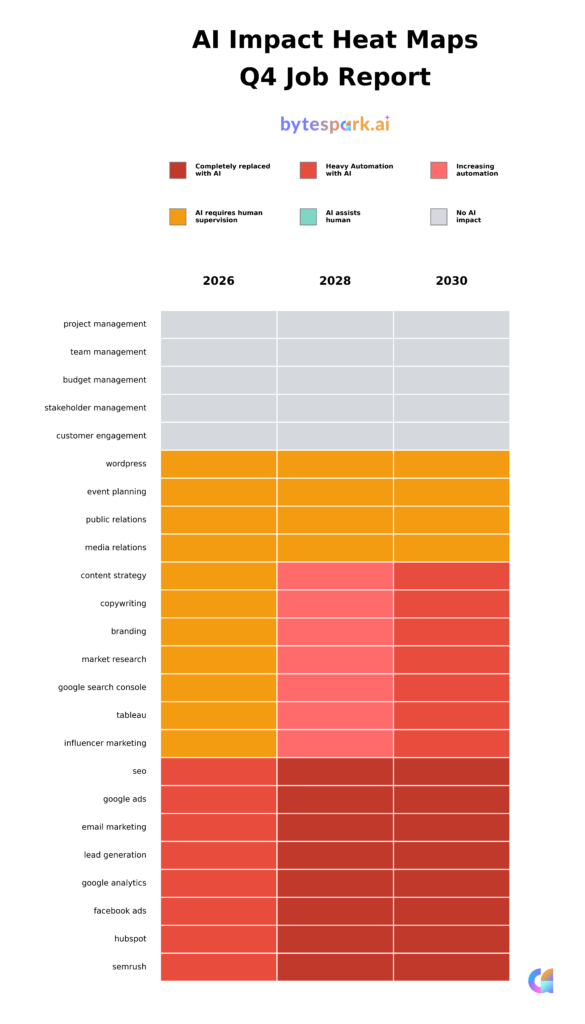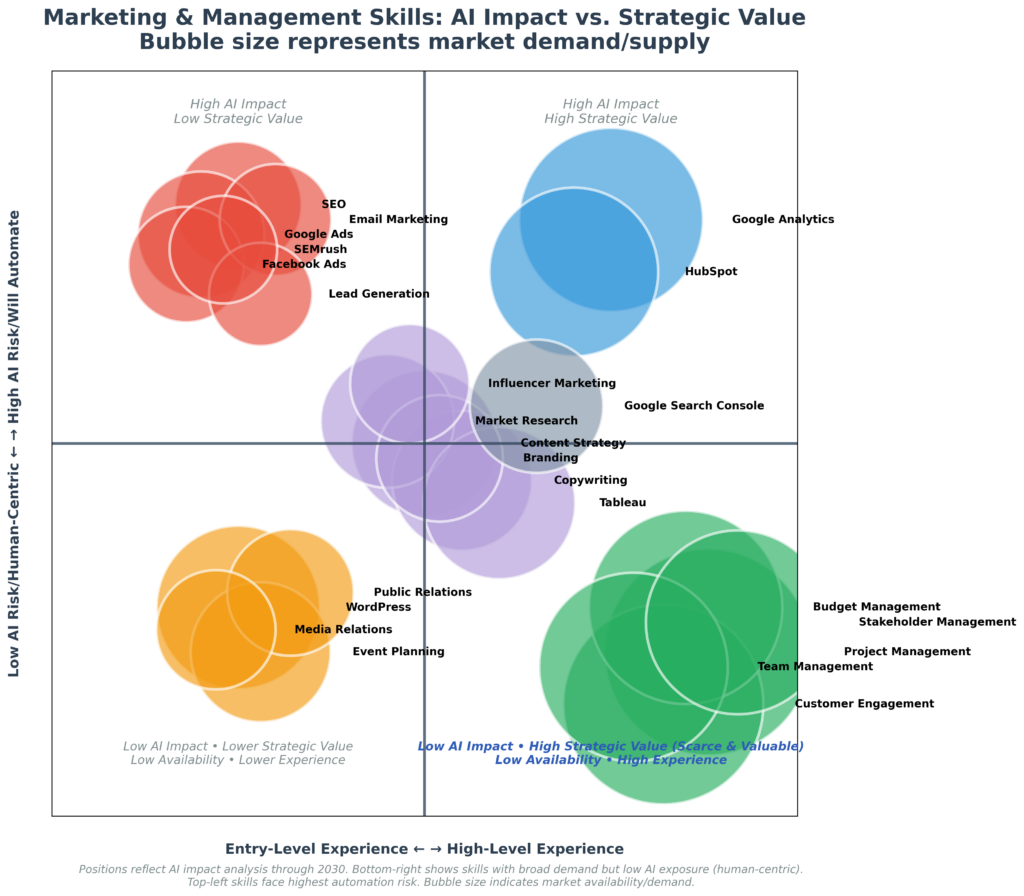The Paradox of Automation: When Machines Do More, Human Leadership Matters Most
As artificial intelligence transforms the workplace at unprecedented speed, a surprising pattern emerges from the byteSpark.ai workforce analysis: while AI is rapidly replacing tactical execution skills, the human capabilities that define exceptional project management are becoming more valuable, not less.
By 2030, our proprietary research at byteSpark.ai indicates that core project management competencies will experience zero AI displacement—not because the technology isn’t advancing, but because these skills represent the irreducibly human elements of organizational success.

The Skills That AI Can’t Touch
Our comprehensive analysis of workplace skills transformation reveals a clear dividing line. While technical execution tasks face 80-100% automation potential, five critical project management capabilities remain firmly in human territory:
1. Strategic Stakeholder Management
AI can schedule meetings and send status updates, but it cannot navigate the complex web of organizational politics, competing priorities, and personality dynamics that define real stakeholder management.
In five years, as AI handles more operational work, project managers will spend less time on task coordination and more time on what truly matters: building coalitions, managing expectations, resolving conflicts, and aligning diverse stakeholders around common objectives. This shift elevates the PM role from coordinator to organizational diplomat.
Why It’s Immune to AI: Stakeholder management requires reading subtle social cues, understanding unspoken organizational dynamics, exercising political judgment, and building trust—capabilities that depend on human emotional intelligence and contextual awareness that AI cannot replicate.
2. Team Leadership and Culture Building
While AI can analyze team performance metrics and identify productivity patterns, it cannot inspire, motivate, or create the psychological safety that enables high-performing teams.
The project managers who thrive in 2030 will be those who excel at:
- Recognizing and nurturing individual team member strengths
- Creating environments where people feel valued and heard
- Managing team dynamics and interpersonal conflicts
- Building cohesive cultures across distributed, diverse teams
- Coaching and developing team members for growth
Why It’s Immune to AI: Human motivation is deeply emotional and contextual. What inspires one person may demotivate another. Effective leadership requires empathy, intuition, and the ability to adapt your approach based on individual personalities and situations—skills that emerge from lived human experience.
3. Complex Judgment and Decision-Making
AI excels at optimizing within defined parameters, but project managers constantly face decisions where the parameters themselves are unclear, contested, or evolving. This is an area where human inference and AI inference have a huge delta.
Consider these common PM scenarios:
- Should we delay the launch to add one more feature, or ship with what we have?
- How do we balance the demands of three different executives with conflicting priorities?
- When should we escalate an issue versus trying to resolve it within the team?
- How do we maintain team morale during a challenging project phase?
These decisions require weighing intangible factors, making judgment calls with incomplete information, and accepting responsibility for outcomes that affect real people’s careers and well-being.
Why It’s Immune to AI: These decisions involve values, ethics, risk tolerance, organizational culture, and human consequences that cannot be reduced to optimization algorithms. They require wisdom, not just intelligence.

4. Budget Management and Resource Allocation
While AI can track expenses and flag budget overruns, the strategic aspects of budget management remain deeply human. Project managers must:
- Negotiate for resources in competitive organizational environments
- Make trade-off decisions that balance financial constraints with strategic goals
- Justify budget requests to skeptical executives
- Reallocate resources mid-project based on changing circumstances
- Manage the political and human implications of resource decisions
Why It’s Immune to AI: Budget decisions are rarely purely financial—they involve organizational politics, strategic priorities, relationship capital, and understanding the broader business context in ways that require human judgment and negotiation skills.
This is based on our customer sentiment but at byteSpark.ai we do not agree with this. We have implemented AI capabilities in the space of compensation and benefits to help companies budget management and resource allocation. It’s a matter of time when our tools will be in the hands of those who think this space is immune to AI.
5. Customer and Client Relationship Management
byteSpark.ai’s proprietary data based on it’s recruitment agency in Dubai and across the GCC, reveals an interesting finding – customer engagement shows zero AI impact through 2030. Why? Because while AI can handle customer service inquiries and generate personalized recommendations, it cannot build the deep, trust-based relationships that characterize successful client partnerships.
Project managers who maintain client relationships must:
- Understand unstated needs and concerns
- Navigate difficult conversations about delays or issues
- Build long-term partnerships based on mutual trust
- Exercise empathy during challenging project phases
- Make clients feel heard and valued as partners
Why It’s Immune to AI: Relationship building requires vulnerability, authenticity, and emotional connection—fundamentally human qualities that clients can sense and that cannot be automated.
The Expanding Gap: What This Means for PM Careers
byteSpark.ai has conducted a qualitative research exercise in which a group of early stage startups, mid tier and enterprise customers were surveyed. Here’s the dramatic shift happening in project management that we are sharing from the ground :
What’s Being Automated (2025-2030):
- SEO optimization and keyword research: 100% AI-enabled
- Performance marketing and ad campaign execution: 95% automated
- Email marketing campaigns: 90% automated
- Data analytics and reporting: 85% automated
- Basic content creation and copywriting: 80% AI-assisted
What’s Becoming More Valuable:
- Strategic thinking and judgment
- Emotional intelligence and empathy
- Relationship building and stakeholder management
- Team leadership and culture development
- Complex problem-solving in ambiguous situations

At byteSpark.ai we see that this creates a profound opportunity: as AI handles more tactical work, project managers can focus almost entirely on the high-value human skills that organizations desperately need but have always been hard to prioritize amid operational firefighting.
The New PM Skillset: Leading in the AI Era
To capitalize on this shift, project managers should focus on developing:

Enhanced Emotional Intelligence
As technical tasks automate, EQ becomes the primary differentiator. Invest in understanding human psychology, conflict resolution, and interpersonal dynamics.
Strategic Business Acumen
With AI handling execution, PMs must become better strategic thinkers who understand business models, competitive dynamics, and organizational strategy.
Change Management Expertise
Organizations will face constant AI-driven transformation. PMs who can guide teams through change while maintaining morale and productivity will be invaluable.
Ethical Judgment and Values Alignment
As AI makes more decisions, humans must ensure those decisions align with organizational values and ethical standards. PMs will increasingly serve as ethical guardrails.
Cross-Functional Integration
With specialized AI tools handling domain-specific tasks, PMs become the crucial integrators who ensure all the pieces work together coherently.
The Bottom Line: From Coordinator to Leader
The AI revolution is not eliminating project management—it’s elevating it.
Five years from now, mediocre project managers who focused primarily on task coordination and status updates will indeed find their roles diminished or automated. But exceptional project managers who lead with vision, build strong relationships, exercise wise judgment, and create environments where people do their best work will be more valuable than ever.
The question isn’t whether project managers will be relevant in 2030. The question is: are you developing the distinctly human leadership capabilities that will define the next generation of project management excellence?
The machines are coming for the tasks. But they’re leaving the leadership to us.
The CEO of byteSpark.ai has been practicing the approach of human supported by AI – and he quotes below :
A future-proof profession is one that excels in combining and balancing the combination of a human worker and an AI worker
Based on comprehensive analysis of 38 workplace skills and their projected AI impact through 2030. Full methodology and data available upon request.






